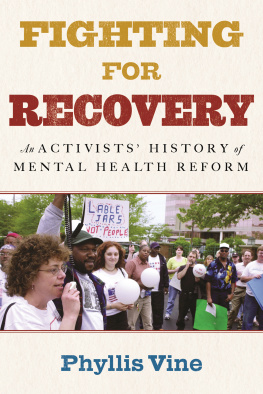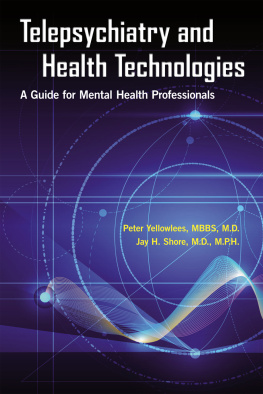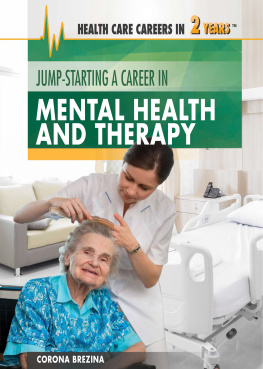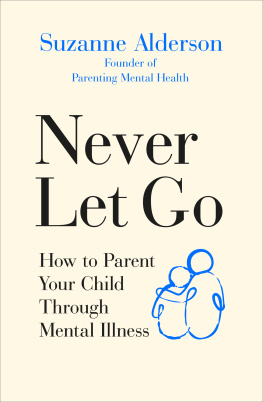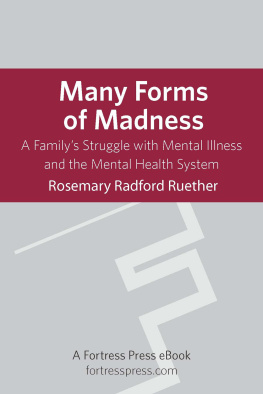Contents
Pagebreaks of the print version
Guide
ADDITIONAL PRAISE FOR FIGHTING FOR RECOVERY
The subtitle condenses the promise of this book: a bracing account by both committed activist and seasoned social historian, Fighting for Recovery is a textual double for the story it tells. Underscore struggle: messy, divisive, unresolved, leaving wreckage in its wake. The roster includes players of various stripes (clinicians, families, bureaucrats, service users/refusers, researchers, even venture capitalists), pitting power politics against street theatre, professional defensiveness against first-person testimony, and even (on rare occasion) discussing relevant research. You may have wondered why psychiatry has been slow to adopt recovery programs. That verdict (coming after more than three hundred pages of painstakingly documented history) will be less mysteriousbut not one iota less sadto any reader of what came before it. The epilogue, a brave coda in its own right, brings the story up to date with shout-outs to promising changes in policing and prisons and a weary, final call for action.
KIM J. HOPPER,
author of Reckoning with Homelessness
I am in awe of this generation-spanning, much-needed history about efforts to improve our tragically inadequate mental health system. Born out of love for a brother, executed with storytelling flair, and featuring a parade of impassioned individuals, Fighting for Recovery introduced me to waves of brilliant reformsand reminded me of the villains who thwarted them. But part of what makes Phyllis Vines book such a find is the effect it had on my morale. While at times it made me cry out in frustration, by the end I took away an empowering message: You are not alone. You are in fellowship with many who envisioned something betterand many who still do. Armed with that sense of solidarity and this illuminating history, I feel newly resolved to keep fighting.
RACHEL SIMON,
author of Riding the Bus with My Sister
Hardly ever does a single text so capably conjoin the personal with both policy and practice in mental health care. Through the lens of her own familys experience with mental illness, Phyllis Vine illuminates key problems and achievements in mental health care over the past half century, while simultaneously giving the reader a detailed view of the development and evolution of the consumer movement and peer support. The results of her efforts are must-reading for anyone who wants to understand how the mental health field has developed and where it must go in the future.
RON MANDERSCHEID,
former president/CEO, National Association of County Behavioral Health and Developmental Disability Directors and the National Association for Rural Mental Health
Fighting for Recovery is a groundbreaking history of the mental health recovery movement in America. It covers both the family advocacy movement and, more importantly, the consumer/ex-patient/survivor movement, from its beginnings with the Mental Patients Liberation advocacy work of the early 1970s through todays peer-support and advocacy organizations, which now provide services in most of the country. I highly recommended it to anyone interested in the mental health recovery movement in America.
MIKE FINKLE,
founder and former executive director, On Our Own of Maryland
ALSO BY PHYLLIS VINE
Household and Kin (with Amy Swerdlow, Renate Bridenthal, and Joan Kelley) (1982)
Families in Pain: Children, Siblings, Spouses, and Parents of the Mentally Ill Speak Out (1982)
One Mans Castle: Clarence Darrow in Defense of the American Dream (2004)

For
Matthew
DRAMATIS PERSONAE
Priscilla Allen, a former patient from California who served on the Presidents Commission of Mental Health.
Bill Anthony (19442020), a psychologist who founded Boston Universitys Center for Psychiatric Rehabilitation, and a pioneering leader on behalf of rehabilitation and recovery.
Bernard Bernie Arons, served administrative positions at St. Elizabeths Hospital and was director of the Center for Mental Health Services in the Clinton administration.
John Beard, executive director of Fountain House, New York City, the flagship of the clubhouse model providing affiliation for patients discharged from Rockland State Hospital in the 1950s.
Arthur Art Bolton, a California social worker leading reform of court commitments, ending in Lanterman-Petris-Short (LPS), and head of the lieutenant governors campaign for an integrated service system.
Bertram Bert Brown (19312020), a psychiatrist and a protg of Robert Felix who cowrote the federal regulations for JFKs Community Mental Health Act. He directed the National Institute of Mental Health from 1970 to 1977 and emphasized the social context of health environments.
Neal Brown, an NIMH administrator who continued support for consumers and peer initiatives when he assumed leadership of the Community Support Program in 1980s.
Su Budd, a Kansas-based ex-patient.
William Will Carpenter, a research psychiatrist starting at NIMH before moving to the University of Maryland, who worked on the John Hinckley Jr. defense team and later became editor of the Schizophrenia Bulletin.
Bernard Barney Carroll (19402018), an Australia-born psychiatrist who chaired the FDAs evaluation committee hearing about clozapine. He was credited with a laboratory test for a hormone associated with melancholia, a type of depression. From 1983 to 1991 he chaired the psychiatry department at Duke University.
Judi Chamberlin (19442010), a first-generation activist, leader, speaker, organizer, and author of On Our Own, who is credited with the rally cry Nothing About Us Without Us.
Paolo del Vecchio, a Philadelphia-based activist who became the first consumer working at the Center for Mental Health Services and rose to become director at Substance Abuse and Mental Health Services.
Anne (McCuan) Drissel, the lead author organizing Towards a National Plan, explaining the component parts of the Mental Health Systems Act.
Robert Felix (19041990), author of the National Mental Health Act in 1946, director of the National Institute of Mental Health (NIMH), and the architect of President John F. Kennedys community mental health centers.
David Ferleger, a Pennsylvania lawyer representing the rights of institutionalized people with disabilities.
Laurie Flynn, the executive director of the National Alliance on Mental Illness from 1984 to 2000.
Larry Fricks, a Georgia-based activist who networked with peers and developed a peer service model receiving Medicaid reimbursement.
Howie the Harp (19531995), the founder of the Mental Patients Liberation Front, an advocate for self-help and peer services, and promoter of social justice.
Howard Goldman, a research psychiatrist, editor of Psychiatric Services, and a consultant on state and federal matters.
Frederick Goodwin (19362020), a research psychiatrist with a specialty in mood disorders who rose quickly through the ranks at the NIMH but ended his tenure in controversy.
Courtenay Harding, a psychologist whose study of a cohort of patients who were discharged from a Vermont state hospital laid the groundwork for recognizing recovery for people with a diagnosis of schizophrenia.

